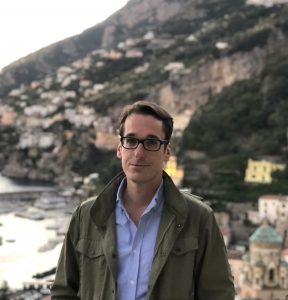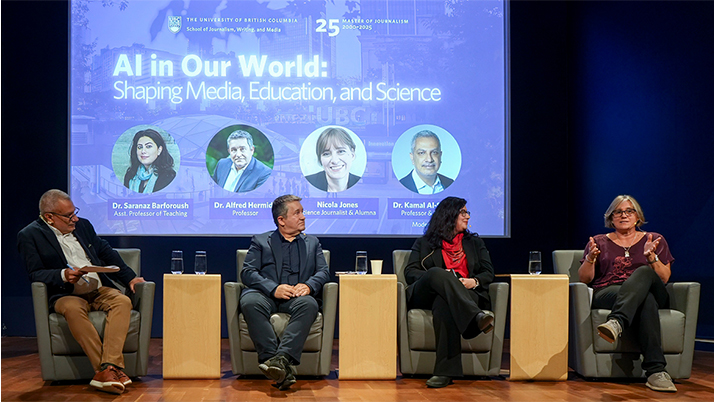

Blake Sifton graduated from UBC Journalism in 2009 and currently splits his time between Turkey and Doha, Qatar, where he works as a freelance News Editor for Al Jazeera English.
He is one of the 10 Global Reporting fellows who produced the Emmy Award-winning documentary Ghana: Digital Dumping Ground.
Here’s what Blake had to say about this time at UBC Journalism and beyond.
What was your experience with the Global Reporting Program while at UBC?
We decided to follow the flow of electronic waste from the western world to the developing world including broken computers, printers etc. In Ghana we learned that shipping containers said to hold working second-hand electronics were arriving from western nations, however in reality almost all of the contents were broken electronics. In other words, illegally exported e-waste. The containers full of e-waste would arrive at the port and then go directly to the dump. However, a lot of the hard drives in the broken computers were working, so we bought a few at a market near the garbage dump. On the first hard drives we checked we found family photos of somebody in the UK and then the credit card information from somebody in Australia.
Right before we were about to leave we decided to buy a few more hard drives. We plugged one in and very quickly we started seeing the names Homeland Security, Defense Intelligence Agency — different American security organizations and military contractors. We did a bit of research and it became clear this was a hard drive owned by Northrop Grumman, which is one of the biggest defense contractors in the U.S. It was basically contracts between them and other American security organizations. It wasn’t a top secret hard drive, but everything was labeled “competition sensitive”. This is a company whose reason for existing is security, and somehow they didn’t prevent their hard drive from being abandoned at a garbage dump in West Africa. We only bought eight hard drives and found one of theirs, so theoretically there were probably many more out there. The discovery of the hard drive took the story to much greater heights and it got a lot of publicity. We were very happy with the documentary we produced with PBS Frontline World.
We submitted our documentary for award nominations. As students, we didn’t think we could win anything, let alone an Emmy. Next thing you know we were nominated for two Emmys. Then, shockingly, we won one.
What did you do right after graduating from UBC Journalism?
I worked for Adbusters Magazine and then I got a job at NBC News Channel during the Olympics in Vancouver in 2010. It was a very low level starting position. But NBC was the main American network covering the Olympics and the News Channel is unique. They gather footage and distribute it to the local affiliate stations, so they’re basically an internal video service for NBC. They’re based in South Carolina, and most of their staff in Vancouver didn’t know a ton about Canada or hockey. I’m a huge hockey fan, and I made it clear pretty quickly that I knew a lot about the US team and the wider tournament. They started sending me to practices and I got to cover the Olympics in a way that I was never supposed to for my job title. I became friendly with the president of the News Channel and we talked a lot about politics and world events.
My (undergraduate) background was Middle East and African politics. At that time I really wanted to work for Al Jazeera English but I had zero contacts. The president happened to know someone who had worked at NBC for 25 years and was then the Head of Input at Al Jazeera English. He offered to put my CV in her hands and the next thing I knew I was hired to work as a Deputy News Editor at Al Jazeera in Qatar. I arrived in early 2011 a week after the protests in Egypt started, but before Mubarak fell, in the early days of the Arab Spring. Al Jazeera led that coverage; we had teams all over Egypt, Tunisia, Libya, Syria, Bahrain and Yemen, everywhere the protests and conflicts were erupting. It was definitely a baptism by fire but it was an invaluable learning experience and nothing (in my career) has ever been as busy or tumultuous since then.
How did the UBC Journalism program help prepare you for your career?
I think the faculty at the UBC journalism program are its strongest attribute and the guidance they can provide and the doors they can help open for you are almost as important as the skills that they teach you.
I consider Peter Klein a mentor. He was a fantastic teacher with a rich background of international news experience. I was thrilled to work with Peter on a documentary about the oil industry for ABC News. This experience, along with the documentary we produced in the Global Reporting Program, taught me a great deal about documentary production. I put these skills to use at Al Jazeera when I produced a documentary about growing up in the shadow of my family’s funeral home and the growing threats facing the industry. It was one of the most meaningful projects I have ever worked on and I don’t think it ever would have happened if I hadn’t studied at UBC Journalism in the first place.
A lot of people come to UBC Journalism for the Global Reporting Program. What advice do you have for students who would like to report internationally?
If you want to work in international journalism I think there are two routes you can take: either work domestically first to gain experience, or pick up immediately and move abroad. Say you want to be an international news correspondent. You can pursue reporting opportunities domestically, preferably at stations in places people might consider unglamorous. You put your time in, gain a great deal of experience and hone your skills. Eventually as you move up through the ranks, maybe you parlay that into international opportunities. The benefit of that is you build a solid foundation of skills. The downside is it can take a long time and you might not get the international assignments you wanted.
The other way is you can simply pick up and move abroad in search of stories and opportunities. There are a lot of challenges here, but if you prepare properly and do your research it can be a good approach. You want to choose a region of the world that’s newsworthy but not saturated with foreign journalists. You don’t want to end up somewhere where perhaps the stories aren’t necessarily interesting to a global audience, or somewhere newsworthy where many international news outlets already have bureaus or experienced stringers. Sometimes getting your pitches approved or being the most appealing candidate for assignments isn’t because you’re the most experienced or skilled, but simply because you’re one of the only reporters on location where news is happening.
Another thing to keep in mind is that as a freelancer, especially abroad, it can take a long time to get paid. You’re going to need to have money saved to support yourself while you get established and build contacts with news outlets to the point where you are consistently being commissioned and published.


